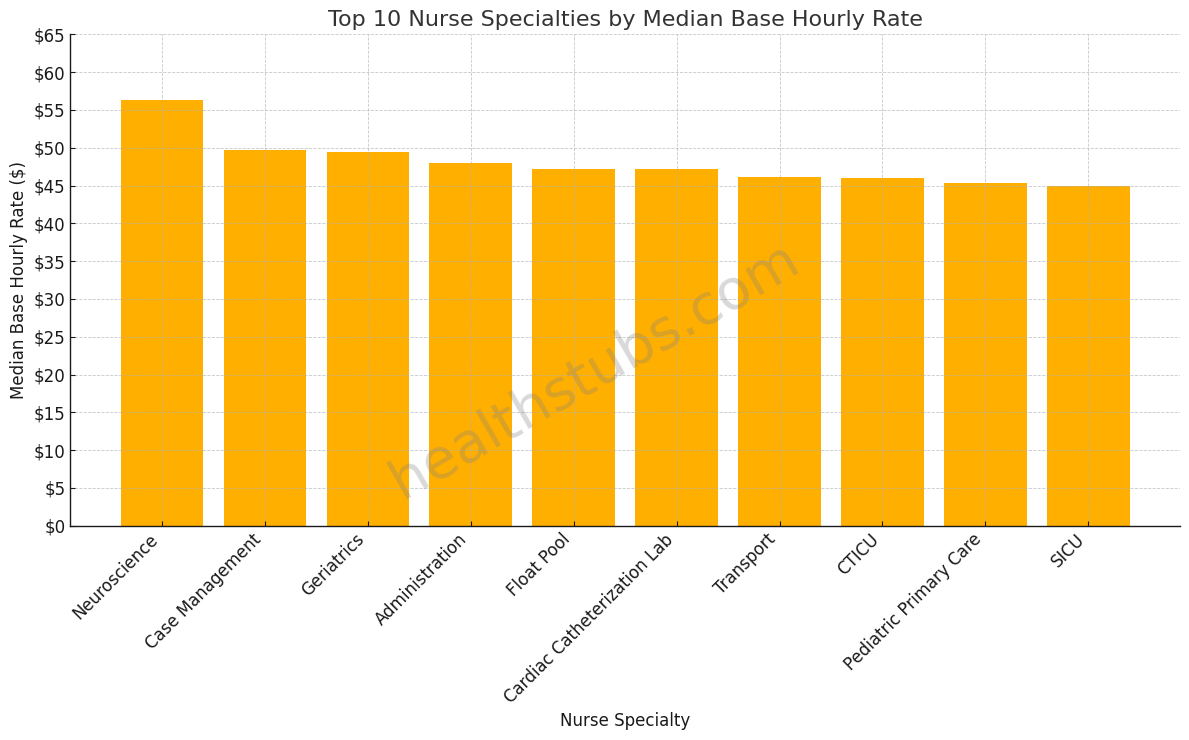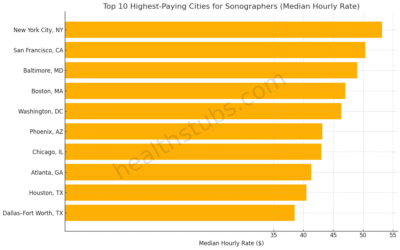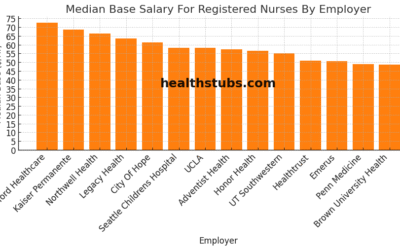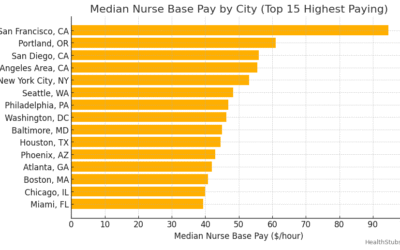There are over 100 different types of nursing roles to choose from. While most deal with patient care, some veer into management and research. And each nursing specialty offers its own pay rate.
According to the 2025 industry survey by Cross Country Healthcare, 86% of nurses are dissatisfied with their salaries. That’s not surprising, given that most paychecks don’t reflect the hard work these professionals put in. As a result, many nurses are now vying for specialized positions that boast the best compensation.
If you’re curious about which specialties pay nurses the highest median hourly rates, here’s a clear look at what’s leading the pack right now.
Top 10 Specialties That Pay Nurses the Highest Median Rates
Not all nursing specialties are created equal. Some roles pay more than others because they require deep expertise and advanced certifications. If you’re ready to make your next big move in nursing, check out the top 10 specialties and their median hourly rates.
Ranking Criteria: HealthStubs analyzed all of our nurse salary data and ranked each specialty by the highest median base hourly rate.
1. Neuroscience
- Median Hourly Rate: $56.32
Neuroscience nurses care for patients with brain and nervous system disorders, such as strokes, epilepsy, and spinal cord injuries. It’s a field that calls for critical thinking in high pressure situations.
Your typical day in this role might include neurological testing, assisting during surgery, and administering medication to patients. Basically, if anything goes wrong (or right), you’ll probably have something to do with it.
This specialty often requires additional certification as a Certified Neuroscience Registered Nurse (CNRN). Also, most employers look for applicants with prior experience in intensive care or emergency settings. Considering the level of responsibility, a $56.32 per hour median base rate makes sense.
2. Case Management
- Median Hourly Rate: $49.76
Case management gives you a break from patient facing roles, but this doesn’t make it any less important. In this position, you’ll coordinate a patient’s care with doctors, social workers, and insurance companies.
This can be challenging because you’re trying to keep everyone on the same page regarding the patient’s recovery plan. However, you’ll find fulfillment in helping patients get better outcomes while reducing healthcare costs.
Most case managers have a strong background in direct patient care before moving into this role. Many have also obtained the Certified Case Manager (CCM) credential to advance their career and become eligible for a median hourly rate of $49.76.
3. Geriatrics
- Median Hourly Rate: $49.50
While empathy is important in every nursing role, geriatrics takes it to another level. In this field, you’re dealing with elderly people who are suffering from age-related illnesses like Alzheimer’s disease, dementia, and diabetes.
Also, you’re not just managing symptoms or placing patients on the road to recovery. You’ll also need to make them feel comfortable and respected. Counseling their families is in the job description, too.
This can be a lot to handle emotionally. But look at it this way: You’re bringing people easing (and peace) as they reach the end of their lives. And with a median wage of $49.50 per hour, you’ll be well compensated for your skill and compassion.
4. Administration
- Median Hourly Rate: $48.00
Nursing administration moves you away from direct patient roles. Here, you’re managing people and creating strategies that help patients achieve better results. Think of it as a bridge between staff and upper level management. The work can be demanding, particularly when you’re dealing with patient safety issues, policy changes, and staffing shortages all at once.
However, at $48, the median hourly pay reflects the responsibility that comes with managing entire units or facilities. If you’re interested in senior management but don’t want to quit nursing, this is the logical next step up.
5. Float Pool
- Median Hourly Rate: $47.25
As a float pool nurse, you’ll go wherever there’s a staffing need. This means bouncing between units in a single day. One shift might mean working in the ICU. Next, you’re in pediatrics or postop recovery.
That kind of work requires flexibility and the ability to think on your feet. You’ll need to swiftly adapt to new coworkers, routines, and patient needs without losing productivity.
Due to the constant variety and added pressure, float pool nurses receive higher rates than many other unit-based nurses. With pay rates averaging $47.25 per hour, you’ll receive a decent salary for your hard work.
6. Cardiac Catheterization Lab
- Median Hourly Rate: $47.20
Cardiac catheterization labs are where some of the riskiest procedures in healthcare happen. Nurses in this specialty diagnose cardiac disorders, help with catheterization, and offer post operative care. It’s a demanding field that calls for a high level of concentration and skill.
This explains why employers choose experienced critical care or emergency room nurses. You need a solid clinical background, the ability to think fast, and the kind of demeanor that doesn’t flinch when things take an unexpected turn.
That level of responsibility doesn’t come lightly, and the pay reflects it. Cardiac catheterization nurses earn a median hourly rate of $47.20. It’s a challenging but meaningful role if you want to be right at the center of life saving care.
7. Transport
- Median Hourly Rate: $46.13
Transport nurses provide healthcare services on the go. This could mean taking a high risk newborn to a children’s hospital or transferring a badly injured man from the ER to an ICU. And because this is an emergency service job, you’ll also be expected to try to keep crash victims alive on the way to the ER.
This role requires great assessment skills. You’ll have to decide what medical equipment and support each patient will need during transit. It’s a high pressure role with high stakes, and the paycheck makes up for it.
At a median rate of $46.13 per hour, transport nursing offers strong compensation for those willing to take on unpredictable, often intense situations where time is of the essence.
8. CTICU
- Median Hourly Rate: $46.00
Cardiothoracic intensive care unit (CTICU) is among the toughest spots in healthcare facilities. As a CTICU nurse, you’ll care for patients who have recently undergone major lung surgery or who may have received a heart transplant. Because their condition can change in a heartbeat, you’ll keep a close eye on monitors so you can spring to action if something goes wrong.
You’ll be managing ventilators, artificial heart devices, and all kinds of life support equipment. Also, you’re required to make quick decisions without second guessing yourself.
Not everyone’s cut out for this kind of pace, and that’s okay. But if you’re the type who thrives in high stakes situations, CTICU nursing is a solid career choice. And at $46 an hour, the pay reflects every bit of that responsibility.
9. Pediatric Primary Care
- Median Hourly Rate: $45.38
Pediatric nursing is a great career option if you enjoy being around kids. Your normal workday at a pediatric primary care unit includes a mix of examinations, vaccinations, cold and scrape treatment, and reassuring anxious parents.
While working with children can be exciting, there are drawbacks as well. The biggest issue is the communication gap because younger children (like toddlers and newborns) are unable to articulate their symptoms. This means you’ll need to use your experience and intuition to fill in the gaps.
Beyond treating illness, a big part of this job involves building trust with your patients by holding their hands, telling jokes, and playing with them. For a job that requires both medical knowledge and the patience to provide care for kids, a median hourly wage of $45.38 is fair.
10. SICU
- Median Hourly Rate: $45.00
The surgical intensive care unit (SICU) handles post-op patients. Most patients you’ll meet have suffered severe trauma, undergone major surgery, or developed complications serious enough to warrant constant monitoring.
Your typical day in this field would involve managing ventilators and administering multiple IV medications and high tech life supporting drugs. You’ll also monitor and respond to any minuscule change in a patient’s status. It’s a fast paced work with high stakes and no room for error. That’s why experienced nurses are the best fit for this role.
A median rate of $45 per hour might be the lowest on this list, but it’s roughly $20 higher than the national average. Plus, it’s decent for a job that demands quick thinking and the ability to navigate the toughest moments in critical care.
Your Specialization Ultimately Depends on You
Nursing is a rewarding field with employee perks. The pay often reflects the knowledge and experience it takes to do the job well. But how much you earn also depends on the specialty you choose.
For example, neuroscience nurses earn the highest median rate because they handle high stakes cases that require advanced medical skills. On the other hand, pediatrics might not pay as much, but if you love spending time with young children, it will still be a fulfilling career.
Although a higher pay rate is important for job satisfaction, you should only pursue a career you’re passionate about. So, if you’re thinking of taking your next big step in the healthcare industry, choose a specialty that rewards your time and expertise.
If you’d like to view compensation data for other healthcare roles, find your role in the HealthStubs salary index, and filter as needed. If you’d like to register to view all of the HealthStubs salary data, click here to register for HealthStubs.




